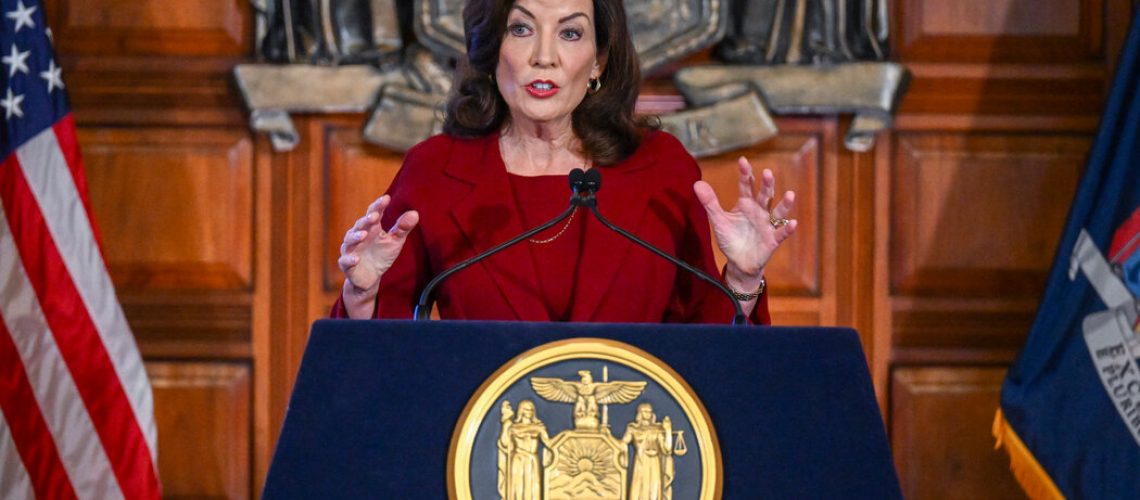ALBANY, N.Y. — Several influential members of New York’s congressional delegation are pressuring Gov. Kathy Hochul to fully embrace a climate bill that would compel the state to build wind and solar energy projects when private industry falls short of state environmental goals.
The effort — an unusual show of force by Washington into Albany’s affairs — was made public on Wednesday in a letter sent to the governor that “strongly” encouraged Ms. Hochul, a Democrat, to fall in line with the state’s left-leaning Legislature and support the bill, known as the Build Public Renewables Act.
Nine of New York’s Democratic members of Congress have signed on: Representatives Jerrold Nadler, Alexandria Ocasio-Cortez, Yvette Clarke, Grace Meng, Adriano Espaillat, Daniel Goldman, Nydia Velázquez, Patrick Ryan and the effort’s leader, Jamaal Bowman.
The measure would lay the groundwork for a publicly owned renewable energy system by allowing the New York Power Authority to build, own and operate renewable energy generation. Each year, the Power Authority would assess the progress made by private industry on the goals set out by New York’s 2019 climate law and would launch its own projects when the private sector falls short.
The proposal has been a top priority for the progressive wing in Albany and was included in the Senate’s one-house budget resolution. The Assembly included a similar version, but omitted a provision that would impose accountability measures on the board of the Power Authority.
Ms. Hochul, a Democrat, has signaled her support for allowing the power authority to own and operate renewable energy projects and included the measure in her own budget proposal. But she fell short of agreeing to mandates that the power authority build to meet climate benchmarks, or the inclusion of labor protections, which proponents say are crucial to ensuring the measure delivers on economic and environmental goals.
“When New York leads, the nation follows,” the letter says, crediting the state’s landmark 2019 climate act as a partial inspiration for the Inflation Reduction Act of 2022, the largest climate investment in United States history, which made available hundreds of billions of dollars to transform energy use and consumption.
“The more the governor moves forward and is aggressive in these areas, the more money’s going to come in” from the inflation act, said Mr. Bowman, who represents parts of Westchester County and the Bronx.
A spokeswoman for the governor did not immediately comment.
The pressure arrives just three days before the state’s April 1 budget deadline, as the governor and Legislature attempt to sort through a panoply of issues and priorities in the state’s annual budget battle royale.
The environmental legislation is just one of the areas in which Ms. Hochul has found herself at odds with her party’s left flank, which also opposes her efforts to again strengthen the state’s bail laws.
In New York, the governor wields a disproportionate amount of power over the budgetary process. But in this conflict, Ms. Hochul faces a largely united Legislature, whose efforts are backed by powerful labor groups.
The landmark 2019 act required that 70 percent of energy be renewably generated by 2030 and entirely carbon-free by 2040. But environmentalists believe that in order to meet the electricity needs of the state, projects will need to be undertaken in locations that are unattractive or unprofitable for private industry.
Those opposing the measure include a coalition of industry groups, including the Independent Power Producers of New York, which contends that it would do little to solve the siting and approval obstacles delaying renewable energy production in New York. They also say that New Yorkers would potentially be on the hook for cost overruns and other liabilities that the Power Authority might incur.
And they fear that the measure would give the state an unfair advantage in the marketplace over the private sector.
“To meet its renewable energy mandates, we need the private sector to remain acutely interested in New York and aggressively develop, invest in, and build wind, solar, and battery storage energy projects,” the groups wrote in a legislative memo opposing all three versions of the law.
Mr. Bowman is hoping the letter persuades Ms. Hochul to support the Legislature’s measure. But if the carrot doesn’t work, he said, there’s always the stick.
“The stick comes from constituents, right? It comes from voters,” Mr. Bowman said. “Everywhere I go, throughout my district, all I hear is energy costs.”



